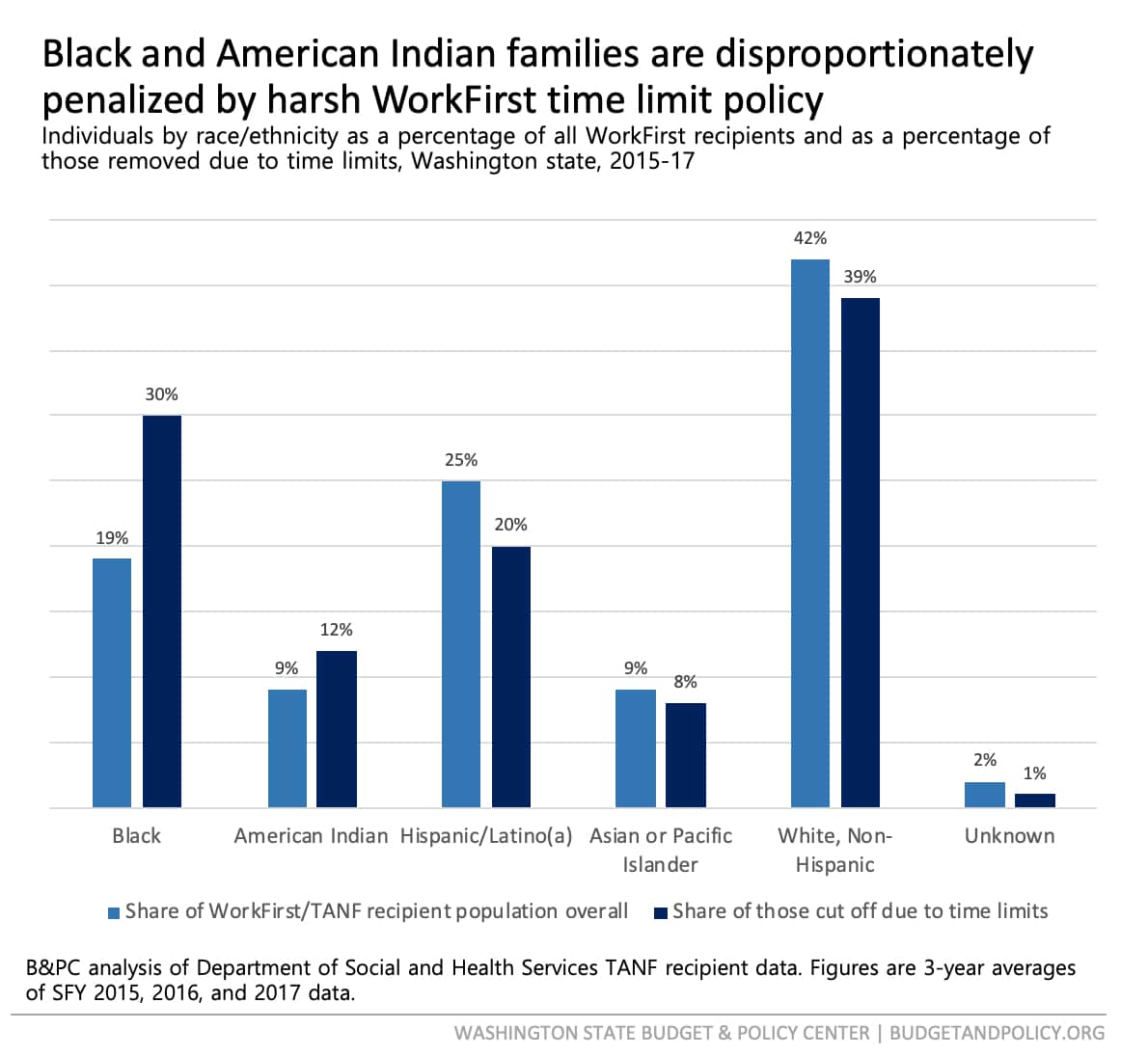As we’ve previously written, Washington state has made deep cuts to its WorkFirst program, our state version of Temporary Assistance for Needy Families (TANF), in the last decade. New data reveal that these cuts have disproportionately harmed Black and American Indian families, who – under the harsh, inflexible time limit policy – are more likely to be cut off WorkFirst/TANF than their white counterparts. So although the WorkFirst program is intended to provide critical support to families who are excluded from opportunity, punitive policy decisions have instead further marginalized people of color from basic resources – threatening to deepen racial income and wealth disparity.
This legislative session, Washington state should take steps to address the racist impacts of WorkFirst policy by reversing cuts to the program it has made over the last decade and creating an Office of Equity to hold government agencies accountable to addressing inequitable outcomes for communities of color.
Black and American Indian families are more likely than other racial and ethnic groups to be denied an extension or removed from Washington’s WorkFirst program due to time limits. Since 2015, nearly one in three people who were cut off of WorkFirst because of time limits were Black, despite the fact that Black people made up just 19 percent of recipients overall.1 (See graph below.) American Indian people were also overrepresented among those penalized under time limits, making up a larger proportion of those cut from the program than the overall recipient population.2
These findings are consistent with research done in other states, which reveals that racism – in the form of caseworker bias and structural barriers to economic security – is to blame for the disparate rate at which recipients of color (especially those who are Black) are penalized under TANF.
Evidence suggests that harsh penalties and inflexible time limits disproportionately harm families of color for two central reasons:
1. Caseworker decisionmaking is informed by racial bias.
Across the nation, researchers have found a pattern of racial disparity in TANF sanctions (penalties imposed when a parent or caretaker can’t meet a specified number of work hours each month). There is strong evidence that people of color, and Black people in particular, are sanctioned at significantly higher rates than whites.3 These disparities emerge at least in part because TANF caseworkers’ decisions to impose sanctions are informed by racial bias. In states including Wisconsin, Michigan, and Florida, researchers have found that caseworkers are much more likely to sanction Black mothers than they are to sanction white women for noncompliance with program requirements.4
While we do not yet have the demographic data to show the extent to which this occurs with sanctions in Washington state, the research suggests there is likely racial bias operating in the process of approving and denying requests for extensions to time limits. Caseworkers exercise a certain amount of discretion when they consider whether a family’s circumstances fit within the narrow range of hardship that would qualify them for an extension.
While WorkFirst recipients are technically able to get a time limit extension due to domestic violence, for example, survivors of color face greater barriers to disclosing experiences of abuse (and are less likely to be believed) across a range of public systems than their white counterparts. Women of color are more likely to be wrongly perceived as the aggressor by police in an incident of domestic violence, have a greater risk of becoming involved in the child welfare system after reporting, and face a lack of culturally responsive advocacy services.5
While research shows that, overall, few TANF recipients surviving abuse can use the domestic violence time limit extension (because of significant barriers to access for all people on TANF), it’s likely that it is even more difficult for people of color to be approved under this provision. Even when caseworkers attempt to be objective, there is room for implicit bias to affect their assessment – leaving families of color vulnerable to racist decision-making.
2. People of color face greater barriers to economic security, and may need WorkFirst/TANF for longer periods of time than their white counterparts.
It’s likely that Black and American Indian families are disproportionately penalized by harsh WorkFirst time limits because of the barriers they face to securing family-wage jobs and a pathway out of poverty. These barriers are rooted in our nation’s history of white supremacy and economic exclusion. Families of color may not be able to leave the WorkFirst program as quickly as some of their white counterparts because they are constrained by barriers like:
- Employment and pay discrimination;
- Lack of fair and adequate public funding for schools, infrastructure, and other community resources;
- Staggering wealth inequality (accumulated over generations of racist policymaking from enslavement to segregation to redlining) that leaves families – and their extended kin and community networks – with fewer financial resources.
The persistent legacy of racism both renders people of color more likely to face financial hardship and undermines their access to opportunities for upward mobility. As a result, some families of color may need additional time to transition off WorkFirst assistance.
This legislative session, Washington state lawmakers have two immediate opportunities to act to curb racial disparity in WorkFirst by:
- Rolling back punitive cuts to the program. Senate Bill 5684 would enact simple fixes to WorkFirst, including allowing families to receive extensions to the time limit when they face continued economic hardship. Rather than simply cut off families who face significant barriers to work, this legislation would allow parents who are “playing by the rules” to get more time to address those barriers. While Senate Bill 5684 maintains this crucial provision, its companion – House Bill 1603 – was amended in committee to strike this flexibility from changes to the time limit. We strongly recommend that the House Bill keep this crucial provision in order to rightly create greater opportunities for families of color to access extensions.
- Creating a statewide Office of Equity by passing House Bill 1783/Senate Bill 5776. This new office would increase the accountability of government agencies to create more equitable outcomes for communities of color. The newly created office would be an appropriate entity to investigate and facilitate systems change to address inequitable outcomes for communities of color under WorkFirst policies, programs, and practices.
It’s critical that lawmakers take these commonsense steps to intervene on racial disparities under WorkFirst, to ensure that all families in our state – whether they are Black, brown, or white – don’t go without the basics. Lawmakers should also work with the Black and American Indian communities in our state to design solutions to address institutionalized racism in how the state serves families of color through its important network of social programs.

